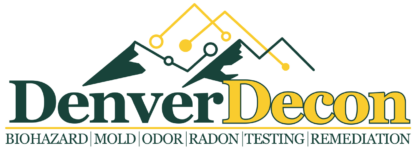How to Identify and Remediate Former Meth Lab Properties in Colorado
The increasing awareness of hidden hazards in real estate has brought the dangers of former meth lab properties to light. Across Colorado—particularly in Metro Denver cities like Aurora, Lakewood, and Thornton—homes and rental units are being discovered with toxic residues left behind from illegal drug production.
If you're a homeowner, landlord, real estate agent, or investor, understanding how to identify and remediate a former meth lab property is essential to protecting your investment and public health.
Signs of a Former Meth Lab in Aurora Homes
Methamphetamine production leaves behind a trail of toxic chemicals that can contaminate walls, HVAC systems, and even subflooring. In cities like Aurora, where older rental properties are common, it’s crucial to recognize red flags such as:
What to Watch for in your Aurora, CO Rental Properties
- Strong chemical odors (like ammonia or acetone)
- Discoloration on walls or ceilings
- Windows blacked out or covered with foil
- Excessive trash with chemical containers or cold medicines
- Unusual ventilation modifications
These signs often go unnoticed during casual inspections. If any of these are present, it's time to initiate a professional assessment.
Meth Contamination Testing in Lakewood, CO
Before remediation can begin, you need to confirm contamination through professional testing. In Lakewood, local health departments often collaborate with certified environmental contractors to evaluate properties.
Steps for Testing Suspected Meth Contamination in Lakewood
- Hire a Certified Industrial Hygienist (CIH) – These experts use wipe sampling techniques to test walls, surfaces, and ventilation systems.
- Compare Results to CDPHE Guidelines – Colorado requires remediation if meth residue exceeds 1.5 µg/100 cm².
- File Reports – If confirmed, testing results must be filed with the state and disclosed to buyers or renters.
How Denver, CO Property Owners Can Legally Remediate Meth Labs...And Why You Want a Professional
Once contamination is confirmed, Colorado law mandates certified remediation. Denver has strict compliance measures to ensure public safety, especially in rental and commercial properties.
Denver’s Certified Meth Lab Cleanup Process
- Assessment & Planning – Develop a cleanup plan with a certified remediation firm.
- Removal of Porous Materials – Carpet, drywall, insulation, and HVAC filters must be replaced.
- Decontamination of Hard Surfaces – All affected surfaces are chemically neutralized and re-tested.
- Final Clearance Testing – A CIH performs a final test to confirm levels meet state safety standards.
- Documentation – Upon passing, a certificate of compliance is issued and can be used in legal and real estate documentation.
Home and property owners in Metro Denver should never attempt meth lab cleanup on their own—it's dangerous, illegal, and can result in long-term contamination if not handled properly. Denver Decon is fully certified by the State of Colorado to perform safe, compliant meth lab remediation, using specialized equipment and protocols to eliminate toxic residue and protect your health, property value, and legal standing. Trust the experts to restore your space safely and discreetly.
Meth Lab Remediation Support in Thornton & Centennial, CO
In fast-growing suburbs like Thornton and Centennial, real estate turnover is high—making it essential for landlords and buyers to understand meth-related risks.
Thornton Home Buyers: What You Need to Know
- Always conduct a meth screening during property transactions.
- Sellers in Colorado are required to disclose known meth contamination.
Centennial Landlords: Staying Ahead of Liability
- Regular inspections can identify suspicious behavior early.
- Retaining a local remediation company like Denver Decon ensures fast, legal cleanup if needed.
Why DIY Meth Cleanup Is Dangerous—and Illegal
Trying to handle meth decontamination yourself is not just dangerous—it’s often illegal. Improper methods can spread contamination, damage your HVAC system, and pose serious health risks.
Meth residue is not like surface dirt—it’s a toxic, sticky residue that embeds itself in porous materials and can’t simply be painted over or cleaned with household cleaners. Colorado law requires remediation by certified professionals for this reason.
Choose Denver Decon for Certified Meth Lab Remediation
Denver Decon is a trusted leader in environmental and biohazard cleanup across the state. Our certified technicians specialize in meth lab decontamination in all major Metro Denver cities including Aurora, Lakewood, Centennial, Thornton, and beyond.
What Sets Us Apart
- Fully licensed and CDPHE-compliant
- Fast, discreet service for homes and commercial buildings
- End-to-end testing, decontamination, and documentation
Final Thoughts
If you suspect a property may have been used for meth production, don’t wait. Exposure to meth residue can cause severe health issues for adults, children, and pets. More importantly, attempting to sell or rent a contaminated property without disclosure or cleanup can lead to lawsuits and fines.
For expert help, reach out to Denver Decon today. We’re here to restore safety, compliance, and peace of mind to Colorado’s homes and businesses.


